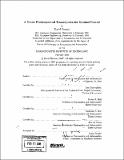A Gauss pseudospectral transcription for optimal control
Author(s)
Benson, David, 1978-
DownloadFull printable version (8.640Mb)
Other Contributors
Massachusetts Institute of Technology. Dept. of Aeronautics and Astronautics.
Advisor
Tom Thorvaldsen and Steven R. Hall.
Terms of use
Metadata
Show full item recordAbstract
A pseudospectral method for solving nonlinear optimal control problems is proposed in this thesis. The method is a direct transcription that transcribes the continuous optimal control problem into a discrete nonlinear programming problem (NLP), which can be solved by well-developed algorithms. The method is based on using global polynomial approximations to the dynamic equations at a set of Gauss collocation points. The optimality conditions of the NLP have been found to be equivalent to the discretized optimality conditions of the continuous control problem, which is not true of other pseudospectral methods. This result indicates that the method can take advantage of the properties of both direct and indirect formulations, and allows for the costates to be estimated directly from the Lagrange multipliers of the NLP. The method has been shown empirically to have very fast convergence (exponential) in the states, controls, and costates, for problems with analytic solutions. This convergence rate of the proposed method is significantly faster than traditional finite difference methods, and has been demonstrated with many example problems. The initial costate estimate from the proposed method can be used to define an optimal feedback law for real time optimal control of nonlinear problems. The application and effectiveness of this approach has been demonstrated with the simulated trajectory optimization of a launch vehicle.
Description
Thesis (Ph. D.)--Massachusetts Institute of Technology, Dept. of Aeronautics and Astronautics, 2005. Includes bibliographical references (p. 237-243).
Date issued
2005Department
Massachusetts Institute of Technology. Department of Aeronautics and AstronauticsPublisher
Massachusetts Institute of Technology
Keywords
Aeronautics and Astronautics.